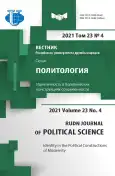Political Trust and Values of Loyal and Oppositional Youth in the Exclave Region of Russia
- Authors: Shchekoturov A.V.1
-
Affiliations:
- Immanuel Kant Baltic Federal University
- Issue: Vol 23, No 4 (2021): Identity in the Political Constructions of Modernity
- Pages: 570-583
- Section: THE DIMENSIONS OF IDENTITY IN MODERN RUSSIA
- URL: https://journal-vniispk.ru/2313-1438/article/view/322095
- DOI: https://doi.org/10.22363/2313-1438-2021-23-4-570-583
- ID: 322095
Cite item
Full Text
Abstract
The study determines the level of trust in public and political institutions among the loyal and oppositional youth of the Kaliningrad region, as well as their attitudes towards materialistic and post-materialistic values. The study is based on R. Inglehart’s theory of value and the understanding of trust as described in the works of P. Sztompka and A. Giddens. The author relies on an online survey conducted among young people aged between 18 and 35 (n = 987). As a result of the study, the author defines three groups of institutions, depending on the degree of trust in them. The study confirms the hypothesis that young people loyal to the government demonstrate greater trust in traditional and state institutions. It also reveals that, in general, young people put post-materialistic values in the first place, while materialistic values are more characteristic of the youth loyal to the government. The author concludes that the level of the political trust towards a certain institution among loyal and oppositional youth differs depending on the possibility of influencing the institution. The trust of loyal youth is based on the importance of social status, and the trust of oppositional youth is based on the freedom of expression.
Keywords
About the authors
Aleksandr V. Shchekoturov
Immanuel Kant Baltic Federal University
Author for correspondence.
Email: ashchekoturov@kantiana.ru
ORCID iD: 0000-0001-6703-4860
PhD in Sociology, Head of Sociological Laboratory of the Institute of Geopolitical and Regional Studies
Kaliningrad, Russian FederationReferences
- Fukuyama, F. (2004). Trust: social virtues and the creation of prosperity. Moscow: LLC “Publishing House ACT”: Ermak. (In Russian).
- Giddens, E. (2011). The consequences of modernity. Moscow: Praxis. (In Russian).
- Inglehart, R. (1997). Postmodern: Changing values and changing societies. Polis. Political studies, (4), 6–32. (In Russian).
- Kiselev, V.O. (2014). Trust in Russian political institutions: Sociological monitoring case study. Monitoring of Public Opinion: Economic and Social Changes Journal (Public Opinion Monitoring), 6(124), 51–64. doi: 10.14515/monitoring.2014.6.05 (In Russian).
- Kozyreva, P.M., & Smirnov, A.I. (2015). Political Trust in Russia: Some Features and the Problem of Optimality. Vestnik instituta sotziologii, 1(12), 79–99. (In Russian).
- Kolosov, V.A., & Vendina, O.I. (2014). The Youth in Kaliningrad, Gdansk and Klaipeda: Geopolitical Vision of the World, Identity and Images of the Other. The Baltic region, 4(22), 7–29. (In Russian).
- Krishtal, M.I. (2018). Political sentiments of the youth of the Kaliningrad region (a sociological analysis). Russian Political Science, 3(8), 105–111. (In Russian).
- Kuchenkova, A.V. (2017). Russian intelligentsia and institutions: trust or alienation? Sociological Studies, 10, 113–121. doi: 10.7868/S0132162517100129 (In Russian).
- Lagutin, O.V. (2021). Value Orientations of Russian Youth in Interaction Models between the State and Civil Society. RUDN journal of political science, 23(1), 107–117. doi: 10.22363/2313-1438-2021-23-1-107-117 (In Russian).
- Leonov, K.A. (2008). Political activity of young people and the level of trust in political institutions. Sociology of power, (1), 106–112. (In Russian).
- Malkina, M.Yu., Ovchinnikov, V.N., & Kholodilin, K.A. (2020). Institutional Factors Influencing Political Trust in Modern Russia. Journal of Institutional Studies, 12(4), 77–93. doi: 10.17835/2076-6297.2020.12.4.077-093 (In Russian).
- Popova, O.V., & Lagutin, O.V. (2019). Political Views of the Youth: Loyalty or Protest? RUDN journal of political science, 21(4), 599–619. doi: 10.22363/2313-1438-2019-21-4-599-619 (In Russian).
- Pyrma, R.V. (2020). Theoretical Aspects of Research of Political Preferences of Russian Youth. Vlast’ (The Authority), 4, 157–162. DOI: https://doi.org/10.31171/vlast.v28i4.7452 (In Russian).
- Radaev, V.V. (2018). Millenials compared to previous generations: an empirical analysis. Sociological Studies, (3), 15–33. doi: 10.7868/S0132162518030029 (In Russian).
- Rudenkin, D.V. (2019). Factor of values in the formation of protest moods of young people: the results of a pilot survey. World of Science. Series: Sociology, Philology, Cultural Studies, 10(1). Retrieved June 23, 2021, from https://sfk-mn.ru/issue-1-2019.html (In Russian).
- Savrutskaya, E.P., Ustinkin, S.V., Bikmetova, T.I., & Nikitin, A.V. (2017). Value Orientations of Youth in its Attitude to the System of Political Institutions of Modern Russia. Vlast’ (The Authority), 5, 8–17. (In Russian).
- Selezneva, A.V., & Antonov, D.E. (2020). The value bases of the civic consciousness or the Russian youth. Tomsk State University Journal of Philosophy, Sociology and Political Science, 58, 227–241. doi: 10.17223/1998863X/58/21 (In Russian).
- Seligman, A. (2002). The problem of trust. M.: Idea-Press. (In Russian).
- Shtompka, P. (2012). Trust – the basis of society. Moscow: Logos.
- Titov, V.V., & Samokhvalov, N.A. (2019). Analysis of social and political values of the youth at the present stage of Russian society development. Azimut of scientific research: economics and administration, 8(1), 51–54. (In Russian).
- Trofimova, I.N. (2017). Political orientations of modern Russian youth. Russia reforming, (15), 304–324. (In Russian).
- Uskova, T.V., Demina, E.V., & Vikulina, M.A. (2021). The hierarchy of values of Russian youth and the perception of the state system of their native country as a factor in the formation of a unified civilizational platform. Notes of a scientist, (3–1), 434–443. (In Russian).
- Vardikyan, M.S., Nikolaeva, A.A., & Savchenko, I.A. (2021). Sociological Study of Protest Mood of Modern Youth. Vlast’ (The Authority), (1), 118–122. (In Russian).
- Vinokurov, V.V. (2017). Intellectual Migration of Students of Kaliningrad Region: Expectations and Reality. Vlast’ (The Authority), 7, 69–74. (In Russian).
Supplementary files









